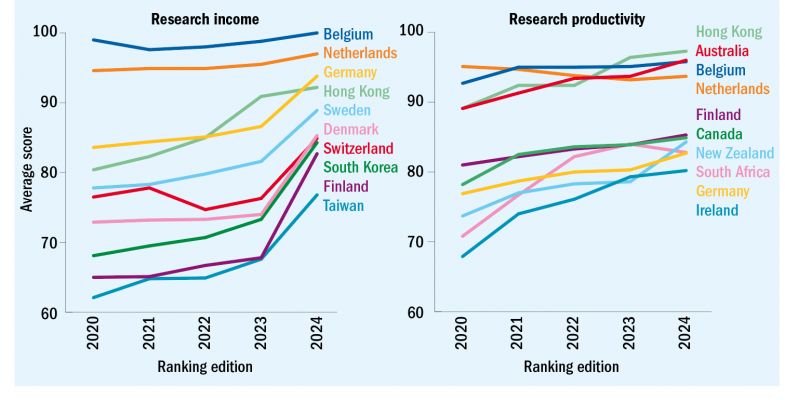Browse the full results of the World University Rankings 2024
Australian universities are punching above their weight in their research output, Times Higher Education data suggest.
The country receives an average research productivity score of 96 out of 100 in the THE World University Rankings 2024, the second highest in the world. This is despite ranking 16th for research income globally.
The research productivity metric is a tally of the number of publications per scholar over a five-year period (between 2018 and 2022 for the 2024 rankings), normalised for subject and scaled for institution size.
Scientific research in Australia has historically been heavily financed from international student fees, due to weaker public funding for science in the country. There have been concerns that the Covid-19-induced decline in foreign recruitment would harm Australia’s research performance, but there have so far been no signs of a decline in research productivity or research income in the rankings.
World University Rankings 2024: results announced
European countries continue to lead the way globally when it comes to universities’ levels of research income, with Asian systems picking up pace. As shown by the time series chart below, seven out of the top 10 countries for research income this year, based on their average metric score in the World University Rankings, are in western or northern Europe.
A closer look at the top-performing nations

Belgium, the Netherlands and Germany have the highest scores for research income when looking at institutions continuously ranked for a five-year period starting in 2020. The analysis only included countries with at least six ranked institutions, while the score for the 2024 ranking is based on figures from 2022.
The research income metric is adjusted for purchasing-power parity and scaled for academic staff numbers, to give a picture of the resources at hand to fuel research.
In addition to the European nations, three Asian countries have high research budgets: Hong Kong, South Korea and Taiwan.
When looking at the five-year trend, the highest jumps in research income scores have been for Finland, South Korea and Taiwan, demonstrating that Asia is on the rise.
The shape of the graph shows mostly consistent growth for four years with an upward slant for many nations since last year, particularly Finland, South Korea and Denmark.
While Belgium saw a slight dip from 2020 to 2021, research income levels in the country are now at their highest point in five years.
But even though European nations have some of the highest research incomes, the research productivity scores show that high research output is seen across the world. While the Netherlands and Belgium led the world on this measure in 2020, Hong Kong and Australia now have the top productivity scores, as captured in the second graph.
Similarly, Canada, New Zealand and South Africa also feature in the top 10, despite their lower levels of research income, telling of the global win for research productivity.
In the five-year period, Ireland, South Africa and New Zealand have seen the most significant improvement in their scores for research productivity. The Netherlands is the only nation on the list that has seen a drop in its average research productivity score (by 1.4 points).
Register to continue
Why register?
- Registration is free and only takes a moment
- Once registered, you can read 3 articles a month
- Sign up for our newsletter
Subscribe
Or subscribe for unlimited access to:
- Unlimited access to news, views, insights & reviews
- Digital editions
- Digital access to THE’s university and college rankings analysis
Already registered or a current subscriber? Login








